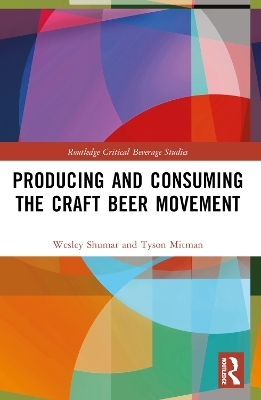
Producing and Consuming the Craft Beer Movement
Routledge (Verlag)
978-0-367-62560-3 (ISBN)
This book will provide an excellent foundation for considering craft beer and an entrepreneurial practice that produces other forms of value beyond monetary value. The craft beer movement has been an important movement for thinking about contemporary consumer culture, and how that consumer culture might develop a very different set of values and priorities from those of the dominant consumer culture that is created by large-scale industries focused on the instrumental values of profit and efficiency. Located in one site, the ethnography is situated within the larger context of the rise of digital media, the evolution of cities, and the latest stage of the capitalist marketplace. The book is distinctive as it is ethnographic in its methodology. It is focused on one locale, the metropolitan area around Philadelphia. Philadelphia, along with Boston, Denver, San Diego, and a few other cities, was a central location for the early development of the craft beer industry. With its interdisciplinary approach, individuals with interests in digital and social media, consumer culture, political economy, ethnography, and contemporary cultural theory will find this an interesting case study of an important industry that developed from the homebrewing movement to become an important craft industry that is now a global phenomenon.
This book is directed to a broad range of readers interested in new media, consumer culture, craft, and contemporary capitalist culture. The book embeds the local in the larger historical and political economic context. Readers would include faculty members in communication, media studies, cultural studies, sociology, and anthropology. Students at a graduate and upper level undergraduate level would be interested as well.
Wesley Shumar is a Professor in the Department of Communication at Drexel University. His research is focused on the commodification of culture, the cultural production of value, the transformation of space, time, and communicative interaction through digital technologies, and the social and interactive processes of learning. His work on higher education focuses on the cultural and spatial transformation of American universities within an increasingly consumerist economy. His work on learning focuses on the ways the internet and digital technologies can enhance learning interactions. He is currently exploring the craft economy and the production of value. He is author of College for Sale: A Critique of the Commodification of Higher Education, and Inside Mathforum.org: Analysis of an Online Mathematics Education Community. He is also the co-editor of Structure and Agency in the Neoliberal University and Building Virtual Communities: Learning and Change in Cyberspace. Tyson Mitman is a senior lecturer in Sociology and Criminology at York St John University. His research examines space and culture. Specifically, how culture and space intersect and interact with each other, how we make our lives through the cultural groups and practices we value, and how we position and debate power, identity, and representation though how we construct differing cultural groups and how those groups are differently allowed to use public and private spaces. Much of his research has been about public aesthetics and graffiti culture. It has focused on how individuals who write graffiti construct their identity within their subculture, how their interaction with public space produces a type of political discourse, and how graffiti affects spaces and those who use those spaces. He is the author of The Art of Defiance: Graffiti, Politics, and the Reimagined City in Philadelphia. He cares deeply about craft beer and respects the producers who are driven by a desire to produce the best product they can, not merely the most profitable one. He believes, at its best, craft beer (and most craft production) helps make caring and informed communities who are capable of resisting the corporate mediocrity mass production so often tries to heap onto all of us.
Chapter 1 – Introduction: The Craft Community
Introduction
What Is Craft?
Central Themes
Chapters in the Book
Chapter 2 – Brewing and Doing Ethnography
Introduction
Boundaries
Ethnography
Positivist Science
Counter Narratives and Trends
Theoretical Practice
Limitations
Chapter 3 – History of Craft Beer
Introduction
Imagination
Authenticity
Community
Brewing in the United States
Early Beer History
Post War Mass Culture and Mass Culture Beer
Craft Beer Begins in the United States
Generations
Craft Brewing in Philadelphia
Chapter 4 – Political Economy and Craft Beer
Introduction
From Welfare Capitalism to Neoliberalism
Globalization and the Political Economy of Consumer Capitalism
The Information Revolution
Spatial Transformations
Transformations in Consumer Culture (Taste Revolution)
Craft Beer in Britain: A Comparison
Summary
Chapter 5 – Knowledge Production and Social Reproduction
Introduction
Invisible College
Communities of Practice and Affinity Spaces
Homebrewing
Themes
Summary
Chapter 6 – Digital Media and the Possibility of Craft
Opening Story
Digital Media and Space
Production/Distribution/Consumption
Summary
Chapter 7 – Values and Value Production
Opening Story
Craft
Authenticity Again
Value and Values
Beer Labels
From Being to Becoming
Conclusion
Chapter 8 – Blurring the Edges: Craft Beer’s Limitations
Introduction
Craft Beer and Alcoholism
White Male Culture of Homebrewing and Craft Brewing
Craft Beer and Race
Craft Beer and Gender
Summary
Chapter 9 – Conclusion
Quality over Mass Consumption
Community and Authenticity
Generations
Digital Media
Current Tensions
Final Thoughts
| Erscheinungsdatum | 28.04.2023 |
|---|---|
| Reihe/Serie | Routledge Critical Beverage Studies |
| Zusatzinfo | 4 Line drawings, black and white; 1 Halftones, black and white; 5 Illustrations, black and white |
| Verlagsort | London |
| Sprache | englisch |
| Maße | 156 x 234 mm |
| Gewicht | 303 g |
| Themenwelt | Naturwissenschaften ► Geowissenschaften ► Geografie / Kartografie |
| Sozialwissenschaften ► Ethnologie | |
| Sozialwissenschaften ► Soziologie | |
| Technik ► Lebensmitteltechnologie | |
| Wirtschaft ► Volkswirtschaftslehre | |
| ISBN-10 | 0-367-62560-1 / 0367625601 |
| ISBN-13 | 978-0-367-62560-3 / 9780367625603 |
| Zustand | Neuware |
| Informationen gemäß Produktsicherheitsverordnung (GPSR) | |
| Haben Sie eine Frage zum Produkt? |
aus dem Bereich


